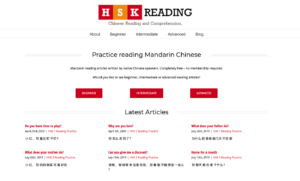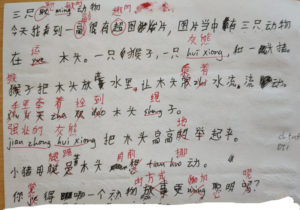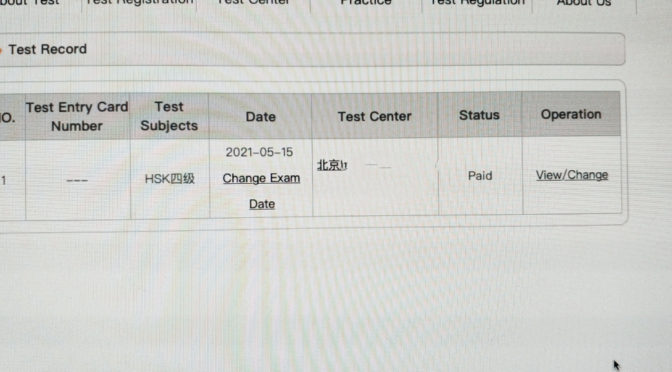So it’s official: I will write the HSK 4 test on May 15th here in Beijing. I need 60% to pass but there is no requirement to do so in order to move on. Even if I fail, I could take the HSK 5 test if I wanted to. However, this is a goal and a check on my progress so far in the Chinese language.
Ideally, I’d like to score much higher than the required 60% but, given my recent attempts at practice tests, I might have to settle for what I can get. I know where I’m losing the most marks: the writing section. Specifically, the part of the test where I have to re-arrange the words into their correct order. I typically only get one or two right out of ten questions. The test only has 95 questions so missing out on that part can seriously damage the overall score.

The frustrating part about losing marks in this section is that it’s difficult to work on without understanding proper Chinese-language sentence structure and, even more confusing, the way the culture thinks about information (which is what the sentence structure indicates).
Many people, including my own teacher, say that Chinese and English grammar are very similar in that they follow the SVO sentence structure. That is, SUBJECT-VERB-OBJECT. This is true. Where things get dicey is how things are qualified and distinguished from other ways and means of doing things. The best explanation I’ve found of Chinese sentence structure was on a website called the Chinese Grammar Wiki.

If you are studying Chinese and are struggling with grammar, I highly suggest you go take a look at the tables they’ve set out that very clearly illustrate the proper structure of a Chinese sentence.
Overall, the SVO will be modified in any number of ways, mostly as information is added in regard how and when things are done. For example:
- I will go to the supermarket.
Add a time stamp and that goes somewhere near the beginning of the sentence:
- Tomorrow, I will go to the supermarket.
English is a bit more flexible in its placement of the time stamp as it can be put just about anywhere in the sentence and it wouldn’t change the meaning so much as it would change the emphasis of the time. But in Chinese, the time stamp typically only goes right before or right after the subject of the sentence. Sure, some Chinese grammarians will point out exceptions, but I’d like to see them try to teach those to students.
Now, this is a relatively simple example but the list goes on:
- the manner in which something is done (happily, sadly, very quickly),
- the location where something is (across the street, at her place), what was used to get it done (instrument),
- who or what the action is aimed at (the target, for him, for her Dad),
- then the verb action itself and,
- finally, how long this thing was done for (several days, three years, etc.)
That is only a brief explanation of how it all works so if you are studying for the HSK tests, I suggest you check out the Chinese Grammar Wiki for a better explanation and set of examples.
How am I addressing this deficiency?
I’m using a few methods.
First, I’m reading more about Chinese grammar in English rather than relying on my Chinese textbooks (which are horribly terse in their explanations). By reading about these structures in English I’m able to draw upon other people’s interpretations of what can go through a student’s mind when they’re studying the language.
Second, I’m doing more dictation exercises. That is, I’m listening to simple texts that are graded for HSK 4 and below and writing down what I hear. For this exercise I’m relying on hskreading.com for their short online texts with audio.

My approach for this exercise is to read the text once, then listen to it, and then the third time I finally start writing, pausing every few words so I have time to write down what I heard. Next, I go through and correct all of the characters I missed. I don’t worry about punctuation as this is more for character learning and awareness of sentence structure.
Here is one of my attempts so far:

Finally, as a supplement to my Chinese classes I’m reading a lot more authentic Chinese. More times than not I opt for reading something actually written in Chinese rather than any more character recognition or textbook grammar drills. The reason being is that I’d rather be in touch with the language itself rather than merely studying it as a subject.
The Hanban Institute (the people who run the test) also hosts several versions of prior years’ tests, so I’ll go through a couple of those before the test date itself. I continue to review characters and vocabulary with APPs like Ankidroid and Duolingo but I’m no longer writing out the characters individually in a notebook. I might start that up again leading up to the test.
One final note about this test: I’m doing the paper-based test rather than the computer-based test. You’ll recall that for the HSK 3 test I did the computer-based test and that helped me out in the fill in the blank section. This time, however, I’ll be on my own using a paper and pencil not just for the listening sections, but the writing sections as well. This should be interesting.
The only problem I see now, however, is that the Hanban institute is changing up the scoring system for the HSK levels and aligning it closer to the IELTS and Common European Framework for Languages band descriptors. In the new version, taking effect in June of this year, the HSK scoring system will move from the current six levels to nine within which the biggest changes will be at the lower levels in that they will require students to know more a larger number of characters and vocabulary. The higher levels, however, are only slightly modified given that much of the work is being pushed downwards rather than upwards.
Given that I’m studying at the HSK 4 level right now, I suspect there shouldn’t be a very big change in my scoring regardless of the system used. Either way, I know I’m not ready for HSK 5 just yet. My only question would be: do I have to buy new textbooks or can I just finish working my way through the ones I have?
So the countdown is on: May 15th is the day I find out just how well my Chinese studies are going. Although I didn’t hit my goal of finishing the HSK 5 books and test just yet, I am progressing and things are making more sense as the days go by.
